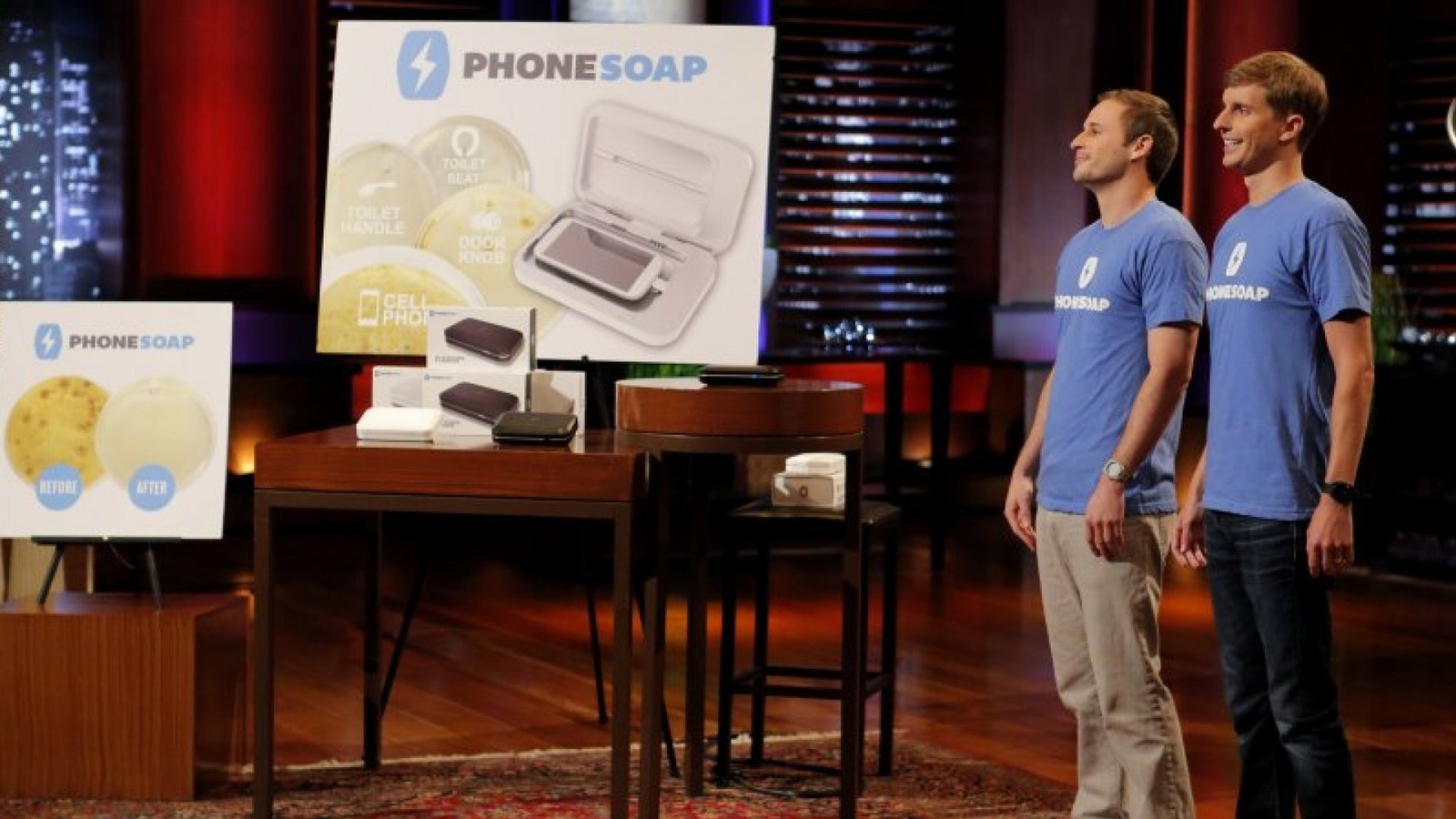
The sixteenth episode of the sixth season of “Shark Tank” premiered on ABC on January 30, 2015, to 7.9 million viewers. In the fourth and final pitch of the week, the panel of potential investors was introduced to PhoneSoap, a UV light-based sanitizer for smartphones and other small objects that allows you to charge the phone while disinfecting it. Though the Sharks were initially skeptical about needing an electronic device for this purpose, the founders of PhoneSoap presented a compelling case for its benefits over topical disinfectants, particularly concerning avoiding damage to users’ phones. Founders Wesley Laporte and Dan Barnes received multiple offers and eventually struck a deal with Lori Greiner after negotiating to mutual satisfaction.
Advertisement
PhoneSoap had only been on the market for a few months when its “Shark Tank” episode was filmed, and its impressive early sales were a sign of more success to come. By the show’s 15th season in 2023, PhoneSoap had sold products worth nine figures, earning its place among the highest-grossing products in the show’s history. The global COVID-19 pandemic heightened awareness about germ transmission, significantly benefiting PhoneSoap’s public profile. Let’s examine PhoneSoap’s journey on “Shark Tank” and how it thrived following the show, bolstered by increased exposure and Greiner’s investment.
What happened to PhoneSoap on Shark Tank?
Wesley Laporte and Dan Barnes entered the “Shark Tank” seeking a $300,000 investment for 7.5 percent equity in PhoneSoap, their business dedicated to UV light-based smartphone sanitizing boxes. Although some Sharks questioned the product’s necessity given existing disinfectant wipes, Laporte and Barnes argued that topical disinfectants like alcohol can damage the oleophobic coating on touchscreen glass. Having clarified this, they moved on to the business side: the founders had already sold 60 percent of the company for $800,000, believing this deal was necessary to secure market entry. In just five and a half months of sales, PhoneSoap recorded $537,000 in revenue through online sales and availability in 400 Staples stores nationwide.
Advertisement
Barbara Corcoran was the first to exit, doubting its superiority over a baby wipe. Kevin O’Leary proposed $300,000 for a $6/unit royalty until his investment was paid back, with a reduced royalty of $3 until he earned $1.2 million, but he retracted when the founders insisted on their valuation. Mark Cuban offered $300,000 for 20% equity, dependent on developing a unit that could clean a phone in 30 seconds and be produced for $12. Then Lori Greiner offered $300,000 for 15 percent. She countered to meet PhoneSoap’s request midway, reducing her offer to 10 percent, leading to a successful deal.
What happened to PhoneSoap after Shark Tank?
PhoneSoap’s rapid success secured it a feature in an official “Shark Tank Update” segment in May 2016. It was revealed that PhoneSoap had grown to 12 employees and achieved $4.9 million in sales within a year of the episode airing. The business continued expanding. In the February 2018 issue of Utah Business, the company was profiled, with Wes Barnes reflecting on his experience on the show. “It’s very scary, even though they prep you,” he shared. “It was a long walk to the sharks. You have to stand on your cue and stay there for one or two minutes, silently staring down the Shark Tank stars.”
Advertisement
By January 2019, while PhoneSoap aimed to penetrate the B2B market, rival company CleanSlate UV filed an FTC complaint alleging false claims by PhoneSoap, the outcome of which remains unclear. Meanwhile, Lori Greiner’s website highlighted PhoneSoap’s achievement of $150 million in sales over the seven years following its “Shark Tank” appearance. The COVID-19 pandemic further solidified PhoneSoap’s position in the booming phone sanitization market. In 2023, celebrating “Shark Tank’s” 15th season, the show released a list of the highest-grossing products in its history, with PhoneSoap ranking 13th with $187 million in sales.
Advertisement
Is PhoneSoap still in business?
As of this writing, PhoneSoap is not only still operational but continues to thrive. The flagship UV sanitizer range now includes nine different SKUs extending beyond phone-sized sanitizer boxes. The flagship models are the PhoneSoap 3, priced at $79.95, and the $119.95 MSRP PhoneSoap Pro, which sterilizes in five minutes. These are complemented by the larger $199.95 MSRP HomeSoap, a $39.95 toothbrush sanitizer, a $99.95 self-sanitizing water bottle, the $99.95 battery-operated PhoneSoap Go, the $99.95 wireless PhoneSoap with Qi charging, and the original PhoneSoap Basic at $49.95. Additionally, the ExpressPro, a “Rapid UV Disinfector” large enough for tablets, sterilizes in 30 seconds and targets the professional sector with a price of $1,499.
Advertisement
PhoneSoap’s products have generally garnered positive reviews. To address skepticism, the company’s website provides detailed information on various bacteria strains each SKU has been tested against, including third-party test results. As for reviews, LifeWire rated the PhoneSoap 3 with 4.3 stars out of five, highlighting its ability to kill bacteria, its charging functionality, and design. Business Insider delivered a positive yet unscored review of the entire PhoneSoap line, as did Popular Mechanics.
What’s next for PhoneSoap and its founders?
Currently, Dan Barnes and Wesley LaPorte remain at the helm of PhoneSoap, with LinkedIn profiles listing Barnes as president and LaPorte as CEO. If they have other nonprofit affiliations, they aren’t reflected on LinkedIn. On social media, Barnes’ X account has been inactive for nearly a decade, and LaPorte’s hasn’t been updated since December 2023, with infrequent prior posts. PhoneSoap appears to be their primary focus.
Advertisement
PhoneSoap has become sufficiently widespread, especially amid the COVID-19 pandemic, that marketing efforts for the sanitizers appear less intensive. Content updates across the brand’s social media platforms vary, yet none are significantly active. No new SKUs or notable PhoneSoap presence at key industry events like the Consumer Electronics Show in January in Las Vegas have been reported for several years. All in all, PhoneSoap is poised to continue as a successful company with a respected product line that stands the test of time.
Advertisement




